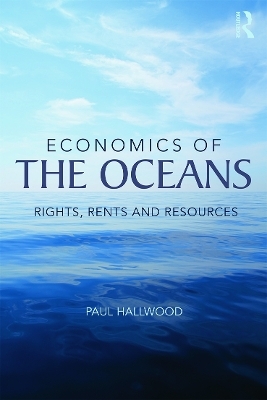
Economics of the Oceans
Routledge (Verlag)
978-0-415-63911-8 (ISBN)
It is an unfortunate truth that our oceans offer valuable resources that are too often used unsustainably. Time and again this is due to the failure of international law to provide a framework for adequate governance. Economics of the Oceans examines this issue and provides a comprehensive study of ocean uses from the perspectives of law and economics.
Themes covered in the book include ocean governance, the economics of oceanic resource exploitation, offshore oil, coral reefs, shipwrecks and maritime piracy. Analytical techniques such as basic game theory, environmental economics of the commons and cost-benefit analysis are employed to illuminate the topics.
This book will be of interest to students of environmental economics, natural resource economics and management, and the economics of international law as relating to the oceans.
Paul Hallwood is Professor of Economics at the University of Connecticut, USA.
Part I: Introduction 1. Ocean Resources, Ocean Governance Part II: Historic Wrecks, Modern Pirates 2. Economic Analysis of Legal Regimes Governing Salvage of Historic Shipwrecks 3. The Economics of Maritime Piracy 4. Maritime Piracy and International Law Part III: Enclosure 5. Enclosure of the Oceans 6. An Economic Analysis of Drawing Lines in the Sea 7. Division of Economic Rents in the Timor Gap Part IV: Fisheries Economics 8. Economics of the Fishery 9. Management of Fish Stocks Part V: Fisheries Regime Formation 10. Impatience, Ecology and Fisheries Regime Formation 11. International Negotiations 12. Preponderant Actors and the Bargaining Game 13. Managing High Seas Fisheries 14. How and Why to Make a Fishery Treaty Ineffective Part VI: Marine Mammals 15. Whales Part VII: Coral Reefs, Marine Protected Areas, Wetlands 16. Coral Reef Economics 17. Marine Protected Areas, Optimal Policing and Optimal Rent Dissipation 18. Contractual Difficulties in Environmental Management: The case of wetland mitigation banking Part VIII: Pollution 19. Oceans and Non-Point Source Pollution 20. Oil Pollution from Ships Part IX: Minerals 21. Taxing Offshore Oil and Gas 22. US Royalty Relief, Rent Sharing and Offshore Oil Production 23. Deep Sea Mining
| Erscheint lt. Verlag | 10.2.2014 |
|---|---|
| Zusatzinfo | 12 Tables, black and white; 49 Line drawings, black and white; 49 Illustrations, black and white |
| Verlagsort | London |
| Sprache | englisch |
| Maße | 156 x 234 mm |
| Gewicht | 480 g |
| Themenwelt | Naturwissenschaften ► Biologie ► Ökologie / Naturschutz |
| Naturwissenschaften ► Geowissenschaften ► Hydrologie / Ozeanografie | |
| Technik ► Elektrotechnik / Energietechnik | |
| Technik ► Umwelttechnik / Biotechnologie | |
| Wirtschaft ► Volkswirtschaftslehre ► Makroökonomie | |
| Wirtschaft ► Volkswirtschaftslehre ► Mikroökonomie | |
| ISBN-10 | 0-415-63911-5 / 0415639115 |
| ISBN-13 | 978-0-415-63911-8 / 9780415639118 |
| Zustand | Neuware |
| Haben Sie eine Frage zum Produkt? |
aus dem Bereich


